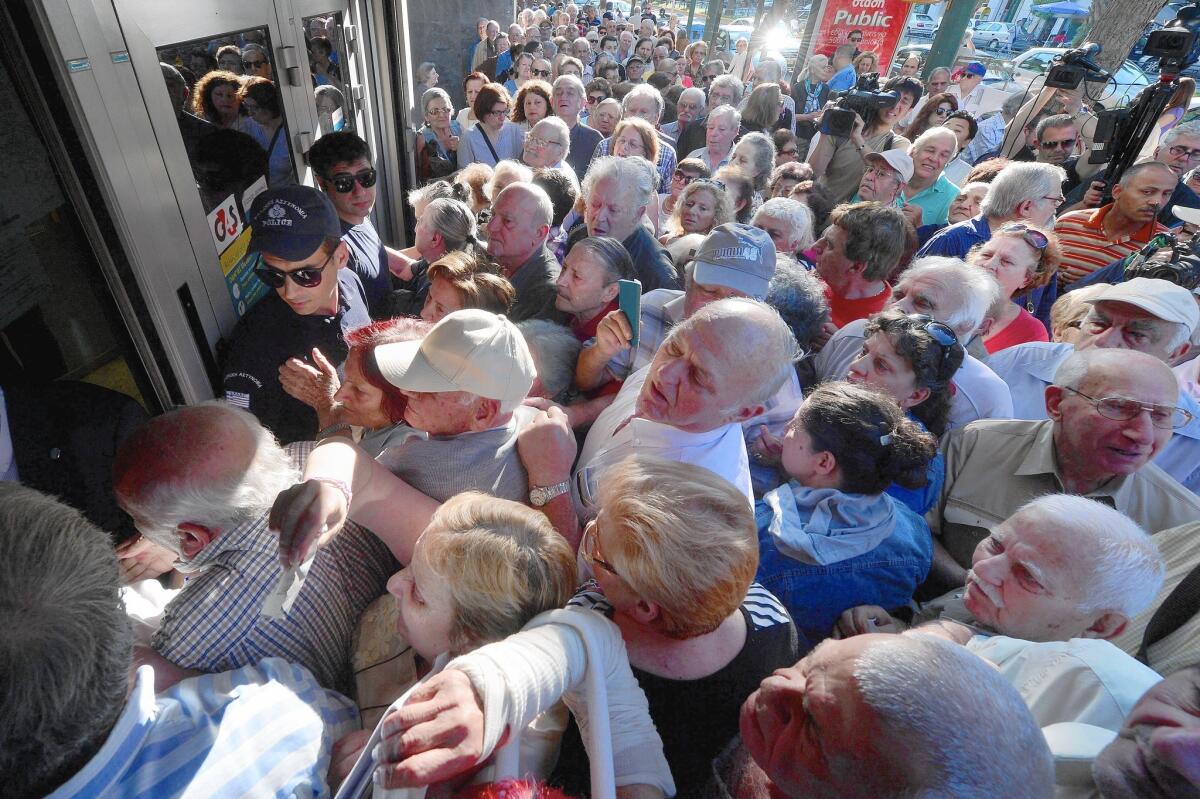Crisis-weary Greece takes another vote, another key deadline in stride

Pensioners mass outside a bank in Athens. Designated banks opened their doors to let retirees draw about $130 a week in benefits. Greeks are limited to $66 a day in ATM withdrawals.
- Share via
Reporting from ATHENS — In the land that gave the world the ancient Stoics, Konstantina Mantziorou was doing her best impression of a modern one as she sat outside her two small shops Wednesday.
She’ll cast one of the most important votes of her life Sunday in a referendum that could determine whether Greece has a future in a united Europe. But Mantziorou was calm, even chatty, as she revealed her uncertainty about the plebiscite.
“It’s very complicated and goes beyond a simple yes-no question. It is all very confusing,” said Mantziorou, 45. She described her and her compatriots as being caught between “a cliff ahead and a ravine behind” — the Greek equivalent of a rock and a hard place.
Voters are being asked to pass judgment on financial bailout terms offered to Greece by its international lenders. The left-wing government in Athens, which called the snap vote, is urging rejection of the deal, ignoring warnings from other European Union nations that a “no” outcome would be interpreted as a wish by Greece to walk away from the euro currency and possibly the EU altogether.
It’s the latest and most serious crunch point in the long-running saga of Greece’s debt crisis, which erupted nearly five years ago.
Since the breakdown of bailout talks last week, the country’s creditors have pulled the plug on emergency loans, banks have been shuttered and cash at ATMs rationed, and relations between Athens and its European partners have hit a poisonous low. On Tuesday, Greece became the first advanced economy to fail to make a debt payment owed to the International Monetary Fund.
Prime Minister Alexis Tsipras defied his fellow European leaders in a fiery televised address Wednesday — now almost a daily ritual — and declared that a “no” vote in the referendum would strengthen his hand in negotiations.
“There are those who insist on linking the result of the referendum with the country’s future in the euro,” Tsipras said. “They even say I have a so-called secret plan to take the country out of the EU if the vote is ‘no.’ They are lying.”
Both the Yes and No campaigns have held huge and noisy rallies and are planning more, with polls showing that opinion remains fluid.
But the mood across much of Athens is subdued as the clock ticks down to yet another crucial deadline in what’s been a seemingly endless series of them.
After five years of punishing austerity cuts that have pushed the unemployment rate above 25%, battered hospitals, increased homelessness and created what some observers have called a humanitarian crisis, many Greeks have long since entered a state of crisis fatigue.
Some are drawing strength from the country’s proud history of courage and patriotic resistance in even more trying times, including the Nazi blitzkrieg during World War II.
“I lived during the occupation. I was one of five children, and my father was injured on the Albanian front,” said 80-year-old Yiannis Siderakis. “We had to eat wild greens, but we lived. We have tough DNA, a tough constitution, and so we must not be frightened.”
Siderakis, a former employee of the state telecommunications agency, waited patiently outside one of the designated banks that opened their doors Wednesday to let retirees draw about $130 a week from their pensions. Greeks are also allowed to draw $66 a day from ATMs, but since many older people don’t have ATM cards, that allowance is of no use to them.
The banks, which were ordered closed as of Monday, started running short of cash after the withdrawal of billions of euros over the last several weeks by worried Greeks seeking a hedge against a collapse of the financial system. The European Central Bank decided Wednesday to keep its emergency aid to Greek banks intact, earning a rare note of thanks from Greece’s outspoken finance minister.
Without its own funding lifelines, the Greek government could also run out of money and default on paying pensions, salaries and other debt obligations within a couple of weeks.
Siderakis is planning to abstain from Sunday’s plebiscite. The reason, he said, is that the result is being deliberately misconstrued: Greeks are being called to vote on one question, but their verdict will be read as being about something else.
But just what that question is remains a source of confusion, and not simply because of its long, convoluted and somewhat technical wording that will ask whether voters approve of the bailout proposals offered up by Greece’s lenders. The checkbox for oxi (“no”) comes before nai (“yes”) on the ballot.
European leaders say those proposals are no longer on the table, after the expiration of Greece’s current Europe-funded bailout package Tuesday night, so even a vote in favor would be nothing more than a moral basis on which to restart negotiations.
Before his televised speech, Tsipras seemed to backtrack on his rejection of the deal, telling creditors in a letter he would in fact accept nearly all their conditions, including more austerity measures, as long as the agreement was part of a broader package that helped Greece meet its debt obligations for the next two years.
Critics accused Tsipras of panicking because European leaders had called his bluff: Rather than capitulate to his demands and stave off the surprise referendum, they were supporting the vote as a statement of where Greece stands on the euro and the EU.
The group of Eurozone finance ministers brushed aside Tsipras’ eleventh-hour offer. Europe’s most powerful leader, German Chancellor Angela Merkel, also said no new negotiations were possible until after Sunday’s vote.
“Given the political situation, the rejection of the previous proposals, the referendum which will take place on Sunday and the recommendation by the Greek government to vote no, we see no grounds for further talks at this point,” said Jeroen Dijsselbloem, the leader of the finance ministers. “We will simply await now the outcome of the referendum.”
Fotis Liosis, 55, has had enough of what he views as European high-handedness.
Once a worker in the restaurant industry, he lost his job in 2009 and hasn’t found a new one. To make pocket change, he stands outside a subway station peddling a publication founded to help the unemployed and homeless; he receives half of the $3.30 for each issue he sells.
For him, only one option is possible at the ballot box Sunday: “no,” even though opponents warn that Greece would then be forced to exit the Eurozone and bring back its former currency, the drachma, at a fraction of the value of the euro.
“I wonder how people could consider otherwise,” Liosis said. “I don’t want any more of these measures. I am in the dirt. But I still love life. I want something better than what I have had over the past six years….
“Things will still be difficult, but at least there will be hope for a more positive future,” he said. “When a man is wet, he is not afraid of the rain.”
But Liosis’ “no” will be canceled out by the “yes” of Giorgos Anagnostou, who wishes there wouldn’t be a referendum in the first place.
Anagnostou, in his 70s, blames Tsipras’ government for negotiating in bad faith.
“Until now I believed that they wanted to reach an agreement, but now I doubt it,” he said. “With a ‘yes’ result there is still a window for an agreement to be reached. With a ‘no’ it will be total destruction.”
Zafiropoulos is a special correspondent.
Twitter: @HenryHChu
More to Read
Sign up for Essential California
The most important California stories and recommendations in your inbox every morning.
You may occasionally receive promotional content from the Los Angeles Times.














